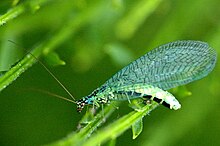Chrysopinae is the nominate subfamily of green lacewings in the insect family Chrysopidae in the order Neuroptera. This subfamily is also the largest within the family and comprises about 60 genera.
| Chrysopinae | |
|---|---|

| |
| Chrysopa perla (Chrysopini) | |
| Scientific classification | |
| Domain: | Eukaryota |
| Kingdom: | Animalia |
| Phylum: | Arthropoda |
| Class: | Insecta |
| Order: | Neuroptera |
| Family: | Chrysopidae |
| Subfamily: | Chrysopinae Esben-Petersen, 1918 |
| Diversity | |
| About 60 genera | |
Members of the genus Chrysoperla and the genus Chrysopa in this subfamily are common in Europe and North America.[1][2] Chrysopinae larvae are predatory and feed on aphids; some of these species have been used in biological pest control, as has the Australian Mallada signatus.[3]
Genera
editThe following 61 genera are divided into four tribes:
Ankylopterygini Navas, 1910
edit- Ankylopteryx Brauer, 1864
- Chrysopidia Navás, 1911
- Parankylopteryx Tjeder, 1966
- Retipenna Brooks, 1986
- Semachrysa Brooks, 1983
- Signochrysa Brooks & Barnard, 1990
Belonopterygini Navas, 1913
edit- Abachrysa Banks, 1938
- Belonopteryx Gerstaecker, 1863
- Calochrysa Banks, 1943
- Chrysacanthia Lacroix, 1923[4][5]
- Chrysaloysia Navas, 1928
- Dysochrysa Tjeder, 1966
- Evanochrysa Brooks & Barnard, 1990
- Italochrysa Principi, 1946
- Nacarina Navás, 1915
- Nesochrysa Navás, 1910
- Nodochrysa Banks, 1938
- Oyochrysa Brooks, 1985
- Stigmachrysa Navás, 1925
- Turnerochrysa Kimmins, 1935
- Vieira Navás, 1913[6]
Chrysopini Schneider, 1851
edit- Anomalochrysa McLachlan, 1883
- Apertochrysa Tjeder, 1966 (syn Pseudomallada[7][8])
- Atlantochrysa Hölzel, 1970
- Austrochrysa Esben-Petersen, 1928[9]
- Borniochrysa Brooks & Barnard, 1990
- Brinckochrysa Tjeder, 1966
- Ceraeochrysa Adams, 1982
- Ceratochrysa Tjeder, 1966
- Chrysemosa Brooks & Barnard, 1990
- Chrysocerca Weele, 1909
- Chrysopa Leach in Brewster, 1815
- Chrysoperla Steinmann, 1964
- Chrysopodes Navás, 1913
- Cunctochrysa Hölzel, 1970
- Eremochrysa Banks, 1903
- Glenochrysa Esben-Petersen, 1920
- Himalochrysa Hölzel, 1973
- Kostka Navás, 1913
- Kymachyrsa Tauber & Garland, 2014[10]
- Mallada Navás, 1925
- Meleoma Fitch, 1855
- Nineta Navás, 1912
- Parachrysopiella Brooks & Barnard, 1990
- Peyerimhoffina Lacroix, 1920
- Plesiochrysa Adams, 1982
- Rexa Navás, 1920
- Suarius Navás, 1914
- Titanochrysa Sosa and Freitas, 2012[11]
- Tumeochrysa Needham, 1909
- Ungla Navás, 1914
- Yumachrysa Banks, 1950
Leucochrysini Adams, 1978
edit- Berchmansus Navás, 1913
- Cacarulla Navas, 1910
- Gonzaga Navás, 1913
- Leucochrysa McLachlan, 1868 (syn Nodita)
- Neula Navás, 1917
- Nuvol Navás, 1916
- Santocellus Tauber & Albuquerque, 2008
Tribe incertae sedis
edit- †Paleochrysopa Séméria & Nel, 1990 (Eocene, France)
- †Pseudosencera Makarkin et al., 2018 (Eocene, Europe)
Gallery
edit-
Semachrysa jade
(Ankylopterygini) -
Italochrysa italica
(Belonopterygini) -
Leucochrysa pavida
(Leucochrysini) -
Chrysoperla rufilabris
(Chrysopini)
References
edit- ^ Shakir, Hafiz Usman; Anjum, Najuf Awais; Ali, Qurban; Saleem, Shahzad; Awais, Muhammad; Anwar, Tauqir (2015). "Molecular systematics of Chrysoperla carnea group (Neuroptera: Chrysopidae) in Punjab, Pakistan". 2015Journal of Global Innovations in Agricultural and Social Sciences. 3 (1): 12–15. doi:10.17957/JGIASS/3.1.677. S2CID 88722322. Retrieved 2022-01-24.
- ^ Brooks, S. J.; Barnard, Peter C. (1990). "The green lacewings of the world: a generic review (Neuroptera: Chrysopidae)" (PDF). Bulletin of the British Museum (Natural History). 59 (2): 117–286. ISSN 0524-6431. Retrieved 10 April 2022.
- ^ New, T.R. (2002). "Prospects for extending the use of Australian lacewings in biological control" (PDF). Acta Zoologica Academiae Scientiarum Hungaricae. 48 (Supplement 2): 209–216. Retrieved 3 February 2011.
- ^ Brooks, S.J. (1997). "An Overview of the Current Status of Chrysopidae (Neuroptera) Systematics". Deutsche Entomologische Zeitschrift. 44 (2): 267–275. doi:10.1002/mmnd.19970440212.
- ^ Winterton, S. L.; Brooks, S. J. (2015). "Review of the green lacewing genus Chrysacanthia Lacroix with a new species from Nigeria (Neuroptera, Chrysopidae)". ZooKeys (517): 71–81. doi:10.3897/zookeys.517.9705. PMC 4547126. PMID 26312027.
- ^ Sosa, F.; Tauber, C. A. (2017). "The genus Vieira Navás (Neuroptera: Chrysopidae): a new species, a key to the species, and new geographic records". Zootaxa. 4258 (1): 43–59. doi:10.11646/zootaxa.4258.1.3. PMID 28609933.
- ^ "Opinion 2254 (Case 3399) Dichochrysa Yang, 1991 (Insecta, Neuroptera): generic name not conserved". The Bulletin of Zoological Nomenclature. 67 (3): 261–262. 2010. doi:10.21805/bzn.v67i3.a4. S2CID 80717626.
- ^ Breitkreuz, Laura; Duelli, Peter; Oswald, John D. (2021). "Apertochrysa Tjeder, 1966, a new senior synonym of Pseudomallada Tsukaguchi, 1995 (Neuroptera: Chrysopidae: Chrysopinae: Chrysopini)". Zootaxa. 4966 (2): 215–225. doi:10.11646/zootaxa.4966.2.8. PMID 34186621. S2CID 235505041.
- ^ Ma, Yunlong; Yang, Xingke; Liu, Xingyue (2020). "The green lacewing genus Austrochrysa Esben-Petersen, 1928 (Neuroptera: Chrysopidae) from China, with description of two new species". Zootaxa. 4822 (1): 101–112. doi:10.11646/zootaxa.4822.1.5. PMID 33056302. S2CID 222839696.
- ^ Tauber, C. A.; Garland, J. A. (2014). "Kymachrysa, a new genus of Nearctic green lacewings (Neuroptera, Chrysopidae, Chrysopini)". ZooKeys (437): 87–108. doi:10.3897/zookeys.437.7984. PMC 4155731. PMID 25197213.
- ^ Tauber, Catherine A.; Sosa, Francisco; Contreras-Ramos, Atilano (2018). "Cryptochrysa Freitas & Penny, a generic homonym, replaced by Titanochrysa Sosa & Freitas (Neuroptera: Chrysopidae)". Zootaxa. 4375 (2): 287–295. doi:10.11646/zootaxa.4375.2.9. PMID 29689776.
External links
editWikimedia Commons has media related to Chrysopinae.
Wikispecies has information related to Chrysopinae.